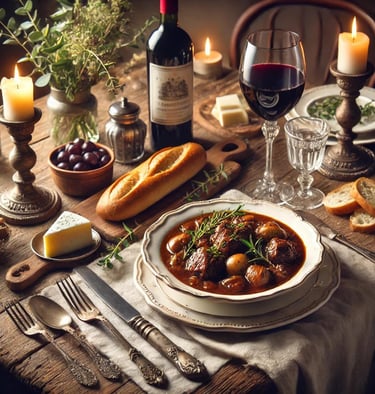French Cuisine: A Sophisticated Blend of Tradition and Flavor
Enjoy the rich flavors of Indian cuisine with exciting recipes, from tandoori dishes to spicy curries. Perfect for home cooks who love bold and aromatic meals.
FOOD


French Cuisine: A Culinary Journey Through Tradition and Flavor
French cuisine is synonymous with elegance, sophistication, and centuries of tradition. Its impact on global gastronomy is undeniable, from the bustling boulangeries on Parisian streets to Michelin-starred restaurants that define fine dining. French food is not just about taste; it's a cultural experience steeped in history, regional diversity, and meticulous preparation. Whether you're indulging in a buttery croissant, a delicate soufflé, or a robust coq au vin, every bite of French cuisine tells a story.
The Modern Influence of French Cuisine
French cuisine has evolved, but its fundamental principles of quality and artistry remain constant. Modern French chefs like Alain Ducasse and Paul Bocuse have brought innovation to classic dishes, making French gastronomy relevant and exciting for new generations. The farm-to-table movement, for example, is deeply rooted in French traditions of sourcing fresh, local ingredients.
A History Rooted in Tradition
French cuisine has a rich history dating back to the medieval era, where it first began to develop under the influence of royal courts. The Middle Ages saw the creation of banquets featuring grandiose dishes, which set the foundation for what would become one of the world’s most respected culinary traditions. By the 17th century, French chefs began documenting their techniques and recipes, solidifying France as the epicenter of haute cuisine.
The French Revolution played a significant role in shaping modern French cooking. As aristocrats fled, their chefs opened restaurants, making previously exclusive dishes accessible to the public. This era birthed iconic French cooking schools such as Le Cordon Bleu, which continue to inspire chefs globally. Today, French food is known for its attention to detail, use of fresh, high-quality ingredients, and a focus on balancing flavors.
Regional Diversity in French Cuisine
What makes French cuisine even more remarkable is its regional diversity. Each part of France brings something unique to the table:
Provence: Known for its light, flavorful dishes using olive oil, tomatoes, and herbs like thyme and rosemary.
Normandy: Famous for dairy products, especially butter and cream, which are key in dishes like Sole Meunière and Crêpes Normandes.
Bordeaux: Renowned for its robust wines and accompanying dishes like Confit de Canard (duck confit) and Foie Gras.
Alsace: Bordering Germany, this region blends French and German culinary traditions, with dishes like Choucroute (sauerkraut) and Tarte Flambée.
Each region not only reflects its geography and climate but also the cultural influences that have shaped its flavors over centuries.
Iconic Dishes and Their Stories
Some of the most iconic French dishes are beloved across the globe, but each has its unique story:
Baguette: The simple yet iconic French baguette is a staple in every home, and its origins date back to Napoleon's time. Legend has it that soldiers needed bread that was easy to carry, hence the long, thin shape of the baguette.
Croissant: This flaky pastry, though often associated with France, was inspired by Austrian bakers and perfected by the French.
Coq au Vin: A traditional peasant dish, coq au vin translates to "rooster in wine." It uses slow-cooked rooster, marinated in wine, which transforms a tough bird into a tender, flavorful dish.
Bouillabaisse: Hailing from the port city of Marseille, bouillabaisse is a rich fish stew traditionally made by fishermen using leftover catch. It’s served with rouille, a garlicky mayonnaise, and crusty bread.
The Modern Influence of French Cuisine
French cuisine has evolved, but its fundamental principles of quality and artistry remain constant. Modern French chefs like Alain Ducasse and Paul Bocuse have brought innovation to classic dishes, making French gastronomy relevant and exciting for new generations. The farm-to-table movement, for example, is deeply rooted in French traditions of sourcing fresh, local ingredients.
A Timeless Culinary Experience
French cuisine is a timeless expression of art, culture, and flavor. Its intricate methods, regional diversity, and historical roots make it one of the most revered cuisines globally. From the elegance of a fine-dining restaurant in Paris to a simple croissant enjoyed in a village café, French cuisine offers an unparalleled culinary experience. Whether you’re cooking a classic dish at home or enjoying a meal at a French bistro, the tradition of French cooking continues to inspire and delight food lovers around the world.
